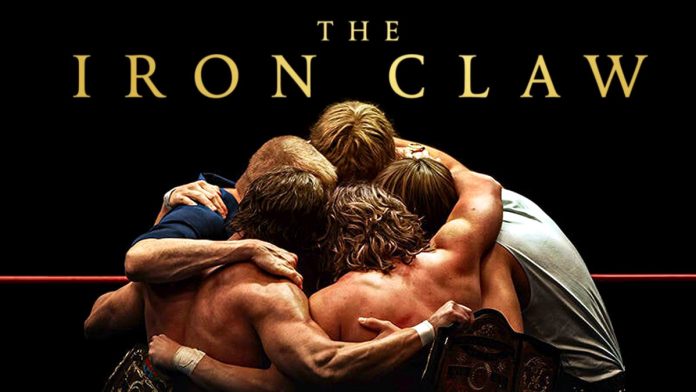
When I originally heard about the concept of a feature film chronicling the turbulent times of the famous Von Erich wrestling family, I didn’t put too much thought into it, specifically because sometimes these films have as much visibility, at least initially, as someone in the witness protection program. There was a really interesting documentary about Vampiro, the Canadian grappler that become a cultural phenomenon in Mexico in his heyday, that was released a few years ago, but without proper distribution, and those deals are difficult to secure, it ended up on some free random streaming platform during the pandemic.
However, when I saw that it was going to get a main stream theater release, I gave the production more consideration, especially because a movie studio isn’t going to pump that type of cash into a project, with the numerous other options available, unless they think there are realistic chances for major box office business.
Granted, I’m generally pessimistic by nature (one of my many character flaws), but I was still skeptical about the potential of the project, given the delicate balance it would have to maintain throughout the movie. Don’t get me wrong, the Von Erich story, as tragic as it is, is worthy of being told on a wide scale, but if it can be packaged, presented, and distributed in a successful way is a completely different matter. The biggest hurdle, at least initially, was that the World Class peak and the time that many of those tragic events happened was nearly forty years ago so would the general wrestling fan of today even know who the Von Erichs are?
Furthermore, and this is not to discount any of the legitimate legacy of the family, but rather a realistic aspect that must be taken into account with a main stream theater release, are the circumstances of the Von Erich story, a regional pro wrestling family from the 1980s, going to give the general public a reason to go to the theater, particularly at a time when newer releases are often available for home-viewing more often than in the past?
Of course, The Iron Claw’s primary audience will be the diehard fans that are dedicated enough to the history of the sport to know who they are, but that often clashes with the need to tailor a narrative to not only fit the big screen format, but also, as mentioned allow for the story to at least be general enough to bring the casual fan into the screening.
It’s a very difficult equation to solve because if the story on-screen strays too far from reality, the diehard fans that know the details will balk at Hollywood’s manipulation of the manipulated sport that they follow, and at the same time, if the story is too inside baseball so to speak with the extended history of Fritz, the guy in the Roman Reigns t-shirt that just wanted to see “the wrestling movie” will be totally lost throughout the film.
Still, I figured it was worth the $11.99 per ticket to see the film, and the great Pat Maclaughlin, who’s old enough to have watched World Class as it happened instead of from DVDs or streaming, invited me to tag along with him to see the movie. Of course, he had permission from Mrs. Mac, the boss or Fritz of the family. Taking into account that he’s a father of four, Pat is probably building his own wrestling family stable.
In the opening credits, the title “inspired by true events” is seen, and while it might’ve been inspired by true events, it didn’t take long to see that doesn’t necessarily mean based on true events.
In an effort to keep this review as organized as possible, I don’t want to parse too many individual scenes, but rather take a look at the narratives that were or weren’t established throughout this movie. First, it should be noted that I found that while the Von Erich tragedy is essentially the reason the family was chosen for a semi-autobiographical film, the script seems to intentionally try to lessen the amount of tragedy that the family endured. For example, Chris Von Erich, the youngest of the brothers that had a short stint as a wrestler before he committed suicide in 1991, isn’t mentioned in the film at all. Reportedly, writer and director, Sean Durkin explained that Chris was omitted because the story would’ve been too depressing if it included another tragedy. The bottom line is, If the story of the real-life Adkisson family is too tragedy for Durkin then I honestly think he shouldn’t have brought the narrative to film. In some ways, it also does a disservice to the amount of grief that Kevin, who was played by Zac Efron, the last surviving brother had to endure during the World Class heyday.
Speaking of Efron, I understand that it makes sense for a major theater release to base the movie around the biggest star available to attempt to maximize box office, that’s one of the sacrifices made if you want to see a niche wrestling story make it to the big screen, but that almost skewed the overall direction of the story. Kevin is the last remaining Von Erich, but the tale of World Class was largely based on David and then Kerry, which this movie doesn’t get across, and actually dilutes at certain points with a very inconsistent timeline. Obviously, we know that “creative license” is sometimes used to condense a narrative to fit the allotted runtime of a production, but “The Iron Claw” rewrites history without any apparent goal being accomplished in terms of advancing the narrative.
In fact, the script implies or presents different aspects off the Von Erich family that either didn’t happen or weren’t even possible. For example, Kerry started wrestling in late-1978, but the film would have you believe that a boycott of the 1980 Olympics led to his debut in professional wrestling. Furthermore, while Kevin started in the business a few months before David, the movie makes it appear like Kevin was a well established star when David joined the family venture. Speaking of 1980, footage of Starrcade 1983 was shown as if it happened three years earlier. David’s passing in 1984 was presented as if it happened directly after Kevin’s wedding, which actually took place four years earlier.
These smaller details chip away and dilute the overall presentation as the film progresses.
It should be mentioned that Maura Tierney, who is known for her longtime role on medical drama ER, did a stellar job as Doris Von Erich. The same can be said for Efron, who looked a lot more like Kerry than the real-life lanky Kevin. Holt McCallany did very well in the role of Fritz, and the acting work by the main cast was generally very well done. The heart of the film, the scenes where the family had to deal with tragedy was superb work. The only problem was, there wasn’t an overall destination where that grief led any of those characters.
In an example of Durkin’s attempt to shield the audience from the tragedy that the movie is based on, Kerry’s 1986 motorcycle accident was presented as if it happened in 1984 directly after he won the NWA world championship in honor of his late brother. In reality, Kerry’s substance issues were well-known and he dropped the title less than three weeks later back to Ric Flair in Japan because the promoters of the NWA knew Kerry couldn’t be a reliable champion. The harsh facts are Kerry being a drug addict, not a motorcycle wreck are what cost him a substantial reign as NWA champion. Unless you already know the depth of the issues that the Von Erichs had, this film cleans up their image, which is counterproductive because again, the grief, and ultimately how it’s handled is the glue of the story. Furthermore, Kerry’s suicide is vaguely explained and makes it seem as if he was just sad during a phone call to Kevin. In reality, an arrest on drug charges and possible jail time were what led to his suicide. There are a few instances of drug use shown in the movie, but it was presented as 80s partying rather than that Kerry had serious drug issues for several years prior to his death.
In an example of how the small alternations can have a major overall impact on the dynamics of the characters, the way that David was portrayed as dying right after Kevin’s wedding, it takes away from the role that the hard-nosed Fritz had in the family. Fritz insisted that his kids make their wrestling commitments so David wasn’t going to miss a booking in Japan, even if he didn’t feel well. Kerry didn’t pursue wrestling because of the Olympic boycott, he started in the business because his dad wanted his kids to follow in his footsteps. Don’t get me wrong, Holt McCallany did great in the role of Fritz, but the scripting of the character didn’t reflect the impact that he had on the family and thus the domino effect that had as the tragedies unfolded. At the same time, there was a scene toward the end of the film where it was implied that Fritz didn’t pay Kevin the money that he was owned, but to my knowledge, nothing like that ever took place. Fritz was domineering because he demanded excellence from his kids, even at the costs of their well-being, but he wasn’t going to pinch pennies. That portrayal takes away from the impact of the character.
A few of the pro wrestler portrayals were comically bad. I’m not sure where the bootleg Ric Flair took acting lessons, but he should ask for a refund of his tuition. With as much creative license as this movie took, it would’ve been better if they hired the real Flair to strut around the set of the Sportatorium. Speaking of the famous Dallas venue, the scenes from there were well done and captured the energy often seen in World Class broadcasts. The guy that was hired to play Harley Race looks like he rotates tires for his day job and appeared rather silly. This film had a budget of $15 million so they could’ve hired Trevor Murdoch, a student of Race and an actual pro wrestler with a similar physique as Harley had in the latter stages of his career, for the role. The conclusion of the film finds Kevin as the last brother of the Von Erich clan, weeping as he watches his young sons play in the yard and then you see the title sequences that tell the audience that the Von Erich family was inducted into the WWE Hall of Fame and that Kevin now lives on a ranch with his family. However, there was zero explanation as to how he got there and more importantly, how he overcame the grief from the tragedy that was on-screen for more than two hours. The jump of the timeline of a few decades without any resolution almost gives the impression of an incomplete story.
It goes without saying that this film will be compared to Mickey Rourke’s The Wrestler because pro wrestling movies rarely make it to the big screen, and even though the cliches of Rourke’s movie don’t hold up as well after a few viewings, it had a destination for the main character that The Iron Claw just doesn’t have by the time the credits roll at the conclusion. The biggest differences is, the Rourke film was a movie about a wrestler, but wasn’t necessarily a wrestling movie, whereas The Iron Claw assumed that either the audience knew part of the story already or simply neglected to take the casual viewer into account. The scenes of grief are powerful and the acting is well-done, but this story never has a firm direction. It a wrestling movie rather than a movie just about wrestlers, but didn’t dedicate enough of the script to serve that purpose. The Iron Claw could’ve and probably should’ve been a film with more depth to it, but outside of the previously mentioned scenes where the family endures tragedy, the movie is rather disjointed in its presentation.
What do you think? Share your thoughts, opinions, feedback, and anything else that was raised on Twitter @PWMania and Facebook.com/PWMania.
Until next week
-Jim LaMotta
E mail [email protected] | You can follow me on Instagram, Facebook, & Threads @jimlamotta89







